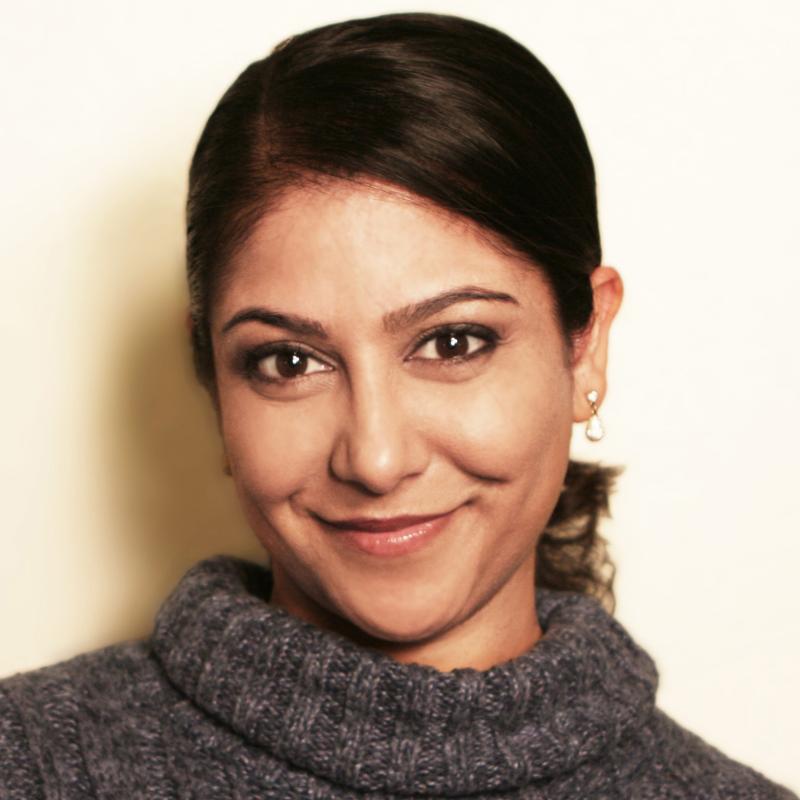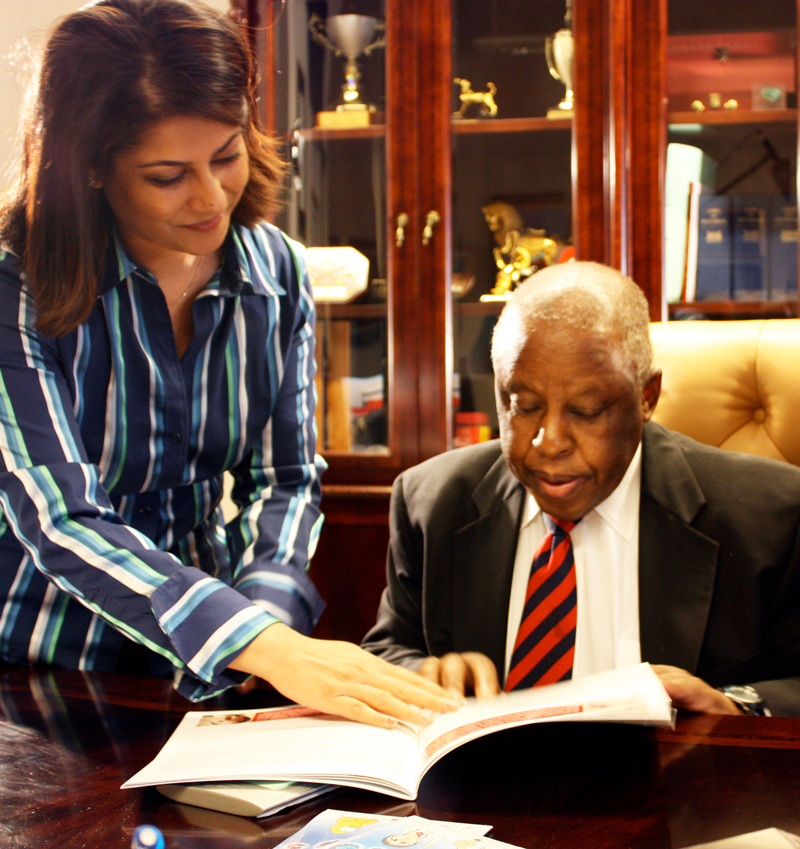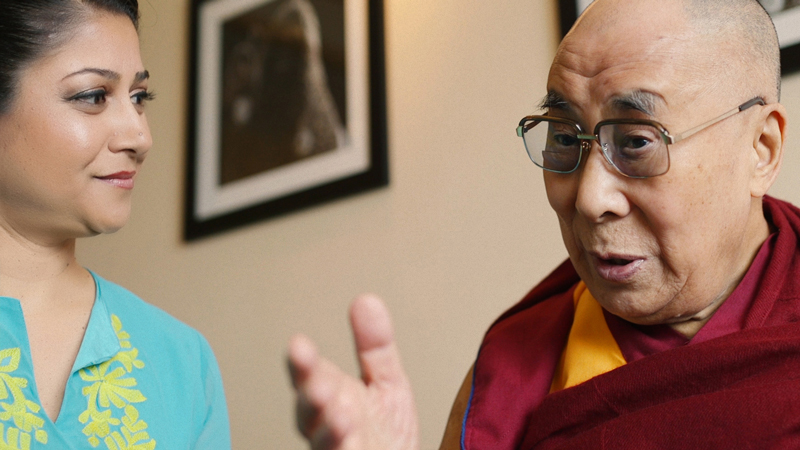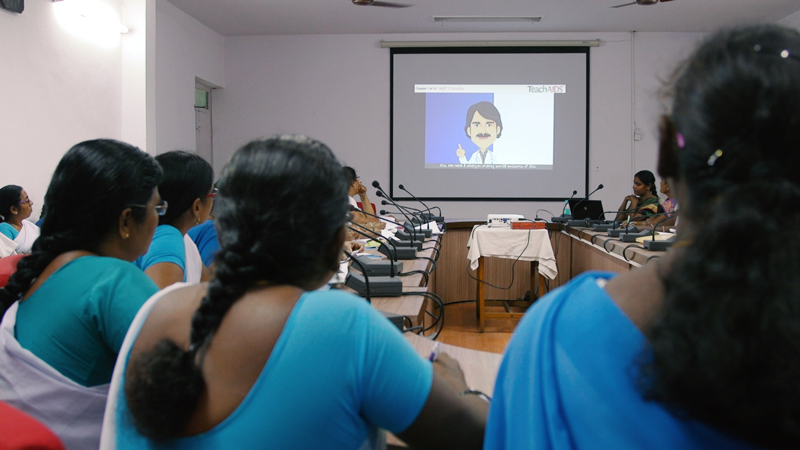
Piya Sorcar, MA ’06, PhD ’09
Piya Sorcar reaches across disciplines and around the world to prevent disease and educate youth.

Impossible feat: Stanford GSE alumna tackles global epidemic with inventive animated software program
Piya Sorcar reaches across disciplines and around the world to prevent disease and educate youth.
By Joyce Gemperlein
Piya Sorcar, MA ’06, PhD ’09 has changed the way HIV/AIDS prevention is taught around the world. In only seven years, the culturally sensitive, animated and interactive software of TeachAIDS, the nonprofit she began working on while attending Stanford Graduate School of Education (GSE), has been adopted in 82 countries and in 27 languages.
Many factors and people are behind its success. Still, Sorcar readily offers that her family’s wide-ranging talents influenced the ways in which TeachAIDS’ free instructional materials that artfully dodge stigmas and taboos tied to discussing sex, homosexuality, intravenous drugs and death.
“I come from a family of artists and performers,” Sorcar said, noting that from the age of three until she became too busy at Stanford, she performed in her family’s international troupe that incorporated dance, magic, lasers and animation. (Yes, she was often made to “disappear” on stage.)
Sorcar returns to a stage on Oct. 20 to accept one of three 2016 Alumni Excellence in Education Awards spotlighting GSE graduates who are transforming education, changing communities and influencing policy.
Joseph Castro, PhD ’98, president of California State University Fresno, and Haydee Rodriguez, MA ’02, a teacher in the Central Union High School District in El Centro, Calif., also will be recognized at the ceremony during reunion week.
“As founder and CEO of TeachAIDS, Piya is on the front lines of using technology to overcome barriers involved in teaching about delicate subjects,” said Shelley Goldman, who nominated Sorcar for the recognition. Goldman, professor of Education and Mechanical Engineering, by courtesy, was Sorcar’s advisor when she was earning her master’s in Learning, Design and Technology (LDT) and was her co-advisor for her PhD in Learning, Sciences and Technology Design (LSTD).
TeachAIDS’ small staff and hundreds of volunteers create and distribute highly researched, free interactive software that uses animation and the voices of locally known celebrities.
In the Indian version, for example, avatars of Bollywood actors use euphemisms to discuss the transmission and prevention of an epidemic that teachers, parents, health care organizations and others around the world are either prevented from or are too embarrassed to talk about to adolescents, teenagers and even adults.
In 2011, Sorcar was recognized as one of the world’s top young innovators by MIT Technology Review magazine.
Last year, His Holiness the Dalai Lama gave his blessings to Sorcar and her organization. His personal physician is the avatar for the software’s Tibetan language version. UNICEF and the Ministry of Education in Botswana, where the infection rate is 23 percent, partnered in distributing TeachAIDS’ materials to every school in the country, naming June 15th their national “TeachAIDS Day”. In India, the government has distributed more than 100,000 copies of the software into schools, hospitals, and local NGOs.
Sorcar has been a highlighted speaker at the United Nations and TEDWomen conferences and sits on the Executive Board of the San Jose Tech Museum’s “Tech Awards.” In 2012, The Jensen Group named her one of “100 Great Disruptive Heroes.”
Family inspiration
Sorcar and others readily connect her childhood exposure to the arts and public service with the core features of the TeachAIDS technology.
“Remarkably, Piya has drawn upon all she heard and did with her family in the world of entertaining and performance to conceive of using animation, cultural icons and more to address HIV/AIDS prevention,” said Goldman.
Sorcar’s late grandfather was the internationally renowned magician P.C. Sorcar; and her father, Manick, is an internationally award-winning animator and artist.
She grew up in Colorado but spent much time in India, absorbing her cultural heritage as her family’s troupe regularly toured raising funds for nonprofits. She was enveloped in the creativity of her grandfather; father; mother Shikha, who made costumes, acted and created storyboards; and sister, Payal, also a performer and dancer.
Sorcar has not always viewed herself as a traditional educator, but she has always been a wizard at multi-tasking. In 2001 she was the first person to graduate from the University of Colorado Boulder with three degrees earned simultaneously –in Business Information Systems, Journalism and Mass Communications, and Economics, summa cum laude.
She toyed with the idea of being a business reporter, but ended up at one of the top economic consulting firms working on transfer pricing and tax-related work.
“Although intellectually fulfilling, I wanted something more personally meaningful,” she recalled.
She considered becoming a physician, but decided after volunteering in a kindergarten classroom that influencing education would be her life’s work.
Serendipitously, Sorcar then relocated to Mountain View with her husband, Shuman Ghosemajumder, who at the time worked for Google in technology security. (After leaving Google to assist Sorcar with the technological infrastructure of TeachAIDS, he moved to a cybersecurity startup.)
“Stanford completely changed my life,” she said.
Teaching taboo topics
The seeds of TeachAIDS were sown in 2005, when, studying for her master’s degree, Sorcar consulted Goldman and professors Martin Carnoy in International Comparative Education; Clifford Nass in Communication; Cheryl Koopman in Psychiatry; Randall Stafford for Epidemiology; and Doug Owens in Health Policy among others, to research the problem of teaching about HIV/AIDS prevention in countries where cultural or societal barriers discourage or prohibit explicit discussions of sex.
Her interdisciplinary interest in the problem continued “as a side project” when she began her doctoral studies focusing on school vouchers. But she switched her dissertation to HIV/AIDS education research after Richard Shavelson, now former dean of the GSE, pointed out in a conversation that she seemed much more passionate about it.
Sorcar’s 2009 dissertation was entitled, “Teaching Taboo Topics Without Talking About Them.” A major finding of her research was that 2D cartoon figures and cultural euphemisms gave comfort and clarity to topics, including sex-related ones. Fortunately, Sorcar knew an award-winning animator: her father, who drew the early illustrations for the TeachAIDS videos. Based on these early mock-ups, her pilot animations were then funded by the Ministry of Science and Technology in South Korea.
“We founded TeachAIDS as a nonprofit in late 2009, shortly after Stanford kindly waived the rights of my work to me, ” she said. “The Graduate School of Education taught me how to think deeply about challenging issues and not jump to answers too quickly,” she said. “I learned that solutions must be research-based and that good technology should be designed while considering the dignity of the people it seeks to serve.”
Her love for Stanford continues from the organization’s office on edge of campus on University Avenue, where their research scope has now expanded to include topics beyond HIV prevention education.
This is the fifth year Sorcar has taught the course, “Designing Research-based Interventions to Solve Global Health Problems” to overflow classrooms of Stanford undergraduates and graduates across all disciplines from medical to business school.
Goldman said Sorcar’s ability to work across departments advising and uniting students, alumni – many of who volunteer at TeachAIDS and in developing countries – “is in the best tradition of Stanford.”
“TeachAIDS is an amazing effort,” Goldman said. “She does every job that needs to be done, working intense, 20-hour days across the world’s time zones. I cannot even estimate how many people I refer to her when they say they want to do work in developing counties.”
“I do sometimes feel as though she is pulling magic tricks,” Goldman said, “making things that seem impossible really happen.”
Joyce Gemperlein, a freelance writer in the Bay Area and a former Knight Fellow at Stanford, is a contributor to the Educator, the online newsletter of Stanford Graduate School of Education. Please read our previous issues and subscribe.
Photos courtesy of Piya Sorcar and TeachAIDS.
For more information about the GSE Alumni Excellence in Education Award reception, and to register for this special event, please visit the GSE’s Reunion Webpage.





